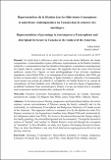Représentations de la filiation dans les littératures francophone et autochtone du Canada dans le contexte des Amériques
Metadata
Show full item recordAuthor
Balint, Adina
Date
2019Citation
Balint, Adina, and Patrick Imbert. "Représentations de la filiation dans les littératures francophone et autochtone du Canada dans le contexte des Amériques." Interfaces Brasil/Canadá 19(3) (2019): 39-56. DOI: 10.15210/interfaces.v19i3.17670.
Abstract
Cet article dont la réflexion se situe à la croisée des études littéraires, des études comparatistes et transculturelles explore différentes représentations de la filiation (familiale, culturelle et communautaire) dans les littératures francophone et autochtone contemporaines du Canada, dans le contexte des Amériques. On rapproche ainsi des textes d’un écrivain québécois comme Éric Dupont, un récit autobiographique d’une écrivaine canadienne anglophone, Jenny Heijun Wills, et un témoignage d’une auteure autochtone, Jane Willis, par la mise en tension entre le sujet littéraire, la lignée familiale et culturelle et la communauté. Ayant recours aux notions de «bâtard» et «d’orphelin» de Marthe Robert et au concept de «nomadisme» de Rosi Braidotti, nous réfléchissons à de nouvelles figures d’appartenance, au-delà de ’exclusion. Nous montrons que la filiation n’est pas une donnée fixe et immuable mais un processus inachevé/inachevable, atalyseur de créativité. At the intersection of literary, comparative and transcultural studies, this article explores various representations of filiation (among the family, culturally and via the community) in contemporary Francophone and Indigenous literatures of Canada as part of the Americas. This approach leads us to compare texts by the Quebecois writer Éric Dupont, a memoir by the Anglophone-Canadian Jenny Heijun Wills and a testimonial by the Indigenous author Jane Willis. We focus on the tensions between the literary subject, the family genealogy, the cultural background and the community. Through the theoretical notions of “bastard” and “orphan” in Marthe Robert’s work and through the conception of “nomadism” in Rosi Braidotti, we study new figures of belonging beyond exclusion. Thus, we show that filiation is not only fixed data but an ongoing process driven by and driving creativity.

